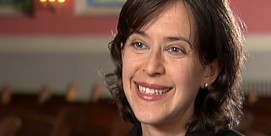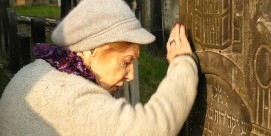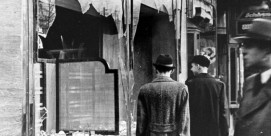Jewish Life and Times at the Movies
by Chris Herlinger
Can you compress the Jewish experience into a 32-movie, 16-day film festival?
You can’t, but you can, at the least, show the enormous diversity of that experience spanning different genres and themes — some overtly religious, some not, says Aviva Weintraub, director of the New York Jewish Film Festival.
The annual festival, now in its 17th year, just ended a two-week run at Lincoln Center’s Walter Reade Theater (with additional screenings at the Jewish Museum), and it gave New Yorkers their yearly opportunity to see a selection of films that “ask hard questions about life, culture, identity, and politics,” according to Richard Pena, the Film Society of Lincoln Center’s program director and a member of the festival’s selection committee.
This year the event attracted films from Israel, the United States, Europe, and Latin America.
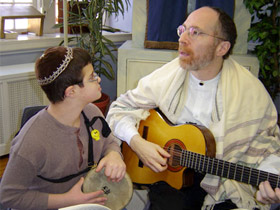
If geographic breadth is something of a festival staple, so is thematic diversity, so much so that Weintraub acknowledges that films touching upon such a variety of experiences — war, displacement, human rights, the relationship between God and community, and even the comic side of life — probably do not have an overtly common theme.
But in an interview Weintraub says she feels many of this year’s films shared “a kind of restlessness, a sense of dialogue and questioning in which there are not always ‘clean’ answers and things are not wrapped up easily.”
That is certainly the case in PRAYING WITH LIOR, a new documentary by American director Ilana Trachtman chronicling the life of Lior Liebling, a Philadelphia teen-ager with Down syndrome who embraces prayer with unusual intensity and passion, prompting friends and family to call him “the little rebbe.” The film opens theatrically in New York City on February 1 and in Los Angeles on March 14.
The story centers on the preparation for Lior’s bar mitzvah, and its honest depiction of the personal and religious struggles of Lior, his family, and his community of faith does not sentimentalize their experiences. While his brother says “Lior is definitely closer to God than anyone else I know,” one of his sisters speaks honestly about her feelings that Lior is too often the center of family attention and concern.
The film may prove to be something of a landmark in examining the spirituality of the disabled. At a screening at the Jewish Museum attended by Jewish and Christian clergy, Trachtman said she was drawn to the subject after meeting Lior and being “mesmerized” by his praying. Despite detractors who told her that no one wants to see a movie about special needs, and it isn’t what a Jewish film is supposed to be about, Trachtman persisted, and her critically acclaimed work is being praised for opening doors for the disabled within religious communities.
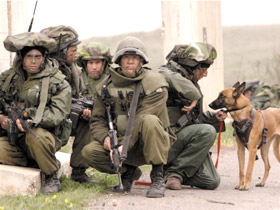
The theme of opening doors pervades another documentary, Nitzan Gilady’s JERUSALEM IS PROUD TO PRESENT, an examination of the controversy in 2006 over Jerusalem’s hosting of World Pride, an international gay rights celebration. In a rare and revealing sign of unity among different religious faiths, the event earned the shared enmity of Jewish, Christian, and Muslim religious leaders, and, as the documentary amply demonstrates, religious conservatives worked vigorously to halt a pride parade through the streets of Jerusalem. Eventually, World Pride had to be curtailed in scope because of the 2006 summer war in Lebanon, but a scaled-back festival took place in several city venues, including a Jerusalem stadium.
At a discussion following one of the screenings, openly gay director Gilady said he revealed his homosexuality to family and friends in the course of making the documentary. “It’s not a fun film,” he said, noting that the movie includes scenes of festival volunteers and organizers fielding threatening phone calls and reading the written threats they received. At one point, documentary footage shows Gilady and others fleeing in a car after opponents physically threatened them on a darkened street. Gilady, a Jerusalem native, acknowledged having a love-hate relationship with his city, but he said his hope that it can embrace a fuller vision of diversity kept him committed to the film project. JERUSALEM IS PROUD TO PRESENT, according to Gilady, does what the controversy over the pride parade did — “put a mirror up to contemporary Israel.”
Joseph Cedar’s BEAUFORT is another such mirror, a dramatization of Israeli soldiers defending a well-known military outpost against bombardments by Hezbollah during Israel’s withdrawal from Lebanon in 2000.
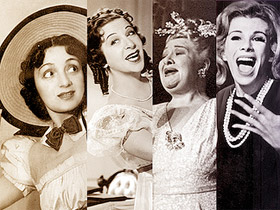
This finely etched study of what New York Times critic A.O Scott calls the “tedium, claustrophobia, and anxiety” experienced by the soldiers is not overtly political, but the distant politics surrounding war — be they decisions made or not made by Israeli leaders or declarations against the war made by anti-war activists – are never far from the foreground of a film some critics have hailed as the finest war movie Israel has yet produced. “Joseph Cedar has created a movie of tremendous power — nerve-racking, astute, and neutral enough to apply to all soldiers, in all wars, everywhere,” Entertainment Weekly’s Lisa Schwarzbaum said about a film that became Israel’s selection as best foreign language film for this year’s Academy Awards and is now one of five such films nominated for the Oscar.
War and catastrophe, flight and displacement — themes so central to the Jewish experience of mid-20th century Europe — dominate a quartet of films by the late Austrian director Axel Corti, who was not Jewish but who had an acute appreciation, according to festival director Weintraub, “for the presence — and later absence — of Jews in 20th-century European history.”
The showing of four Corti films amounted to a kind of festival-within-the-festival and offered what Weintraub said was a much needed retrospective for a director little known in the United States who is considered a figure of conscience for Austria. Corti was also, as the festival screenings proved, a superb craftsman: GOD DOES NOT BELIEVE IN US ANYMORE (1982) is his riveting and hauntingly realistic depiction of a young Viennese Jew’s “life-on-the-run” in the aftermath of Kristallnacht, the 1938 pogrom against Jews in Germany and Austria, and the murder of his father.
No Jewish film festival could be complete without humor, and several films added a welcome comedic touch. One was American Rachel Talbot’s MAKING TROUBLE, a documentary that examines several generations of Jewish women who made their mark in the world of entertainment, including Molly Picon, a doyenne of Yiddish theater; the beloved vaudeville star Fanny Brice; comedienne Joan Rivers; the late television comic Gilda Radner; and playwright Wendy Wasserstein, who died two years ago.
In the midst of bleak times, dark themes, and a host of films about ambiguity, yearnings for the divine, and the tragic side of life, “people need comedy,” says Weintraub. “They need a laugh.”
New York-based freelance journalist Chris Herlinger last wrote for Religion & Ethics NewsWeekly on film and human rights.


